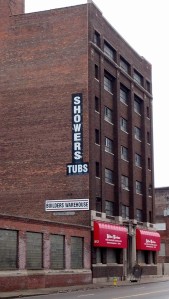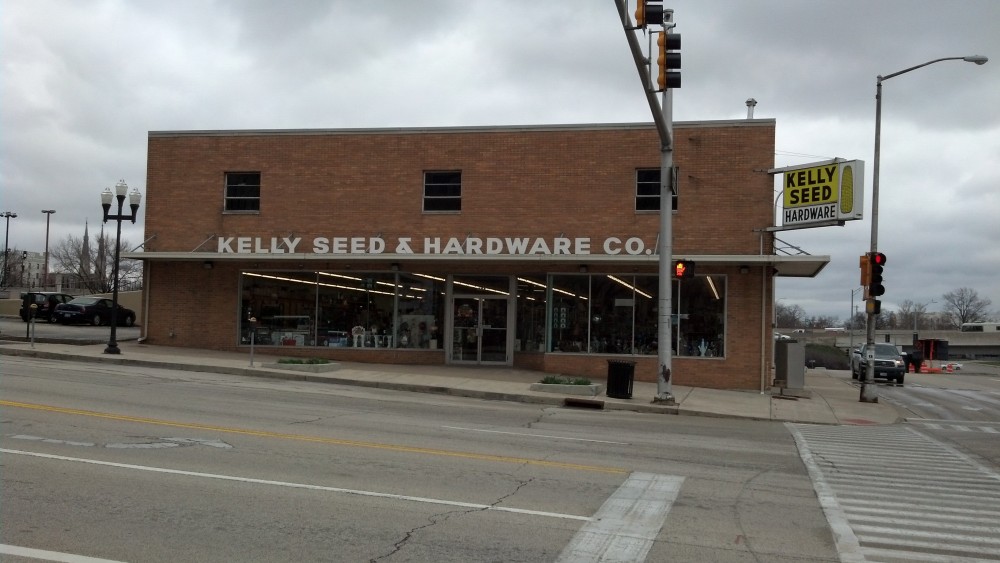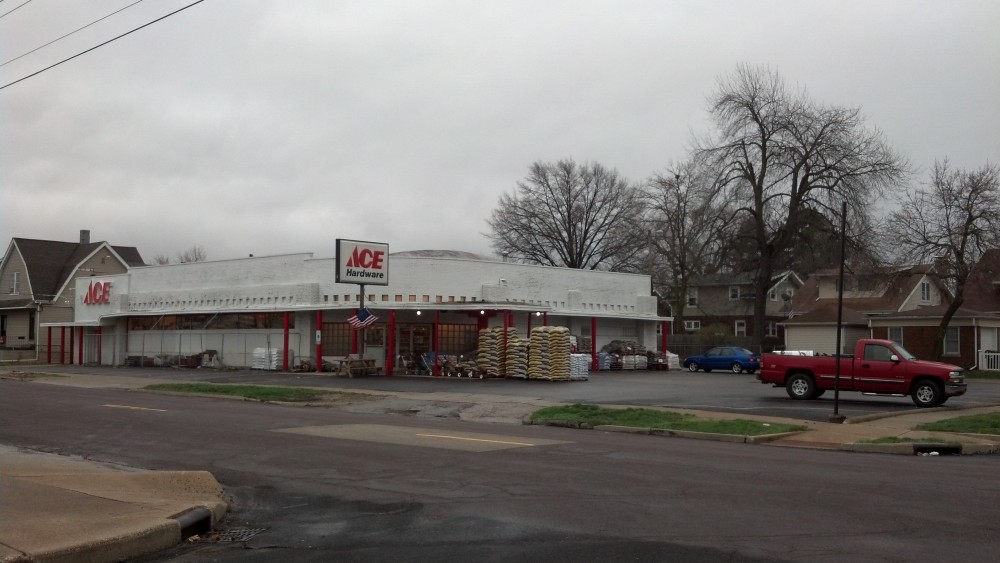We’ve all been there… trying to stretch our paychecks to the max to get what we need and maybe with the little extra leftover buying something we want. Hell, I’m still there. We’re given a plethora of choices of where we could spend it: that small, local business that you’ve heard some much about from a friend or family member, reading a great review about it in a blog, that someone Liked on Facebook, or… we can choose the big conglomerate on the outside of town that has everything you need under one roof at really low prices.
Normally, you consider yourself to be the trailblazer of individuality, but under these tight economic circumstances you are pondering whether or not to sell yourself out to save a few bucks so you might be able to afford something from your wish list.
Tugging at your emotions during the purchase process is that nagging feeling of going to that little place around the corner from you or doing what you’ve done before by going to the big, corporate main-stay. The usual self-conflicted arguments run through your sub-consciousness… “I don’t have the extra money right now.” Or, “I don’t have the time to go…” Or, as if you’ve never had to search aisle to aisle looking for what you need, you then think, “I don’t know what _____ has?”

The excuses build up. Each time that you continue to forgo local authentic and original slowly get erased. We look at what happened to our city centers, Main Streets, Mom & Pop’s, and our old neighborhoods from a sympathetic distance. We miss them for more than just the memories, but we hope someone else will take the daring steps to fix them for us.
We have continued to disengaged from the communities we live in. We don’t quite understand the hardship small business owners endure and the constant struggle they face reinvesting in a community they likely grew up in. We take for granted that they risk their livelihoods day-in-day-out to support a place they are rooted and believe in. But why?
Unbeknownst to us, we have created this consumer marketplace that has come to be accepted as the norm. Is it normal though? We may think we have everything thing within a short drive and we have our finger on the pulse of the latest and greatest, but is it stimulating our communities, spurring innovation, creating new opportunities, or is it just prolonging the stagnation of our cities right under our noses?
A quiet war has been waged between small, local businesses and the lure of big, corporate chains. It is fueled by misunderstood perceptions of each. It has taken place right in front of us and over the past few decades.
From the hopes of that shovel-ready piece of dirt that a building will built upon, to the forecast of (x) amount of jobs, and anticipated sales tax revenues has eclipsed how important it is to support entrepreneurs grown from within, preserve our cultural heritage, and maintain a sustainable footprint in our cities.
The question then arises, when, if ever, is the time to shop local? I’m not going to tell a tale of how I was born only buying local and this is the only lifestyle one can choose. Nah… I’d prefer to let you decide on your own but harbor that guilt that festers inside of you every time you are in the checkout line at the big-box store down the stroad from you.

You have the choice to dictate the outcome of your city or town. Do you choose to abide by the status quo and just accept choices being made for you, or would you rather support something that is unique to your area and caters specifically to yours and your neighbors needs?
Consumers with little choice are left to choose only what’s left available. As part of my GO URBAN project, I have chosen to make it the utmost priority to support local businesses while renovating this house. Shopping hyper-local in the 61603 zip code will no doubt present its difficulties due to the lack of nearby businesses, but conducting this research it will allow me to document the strengths and weaknesses of the local business scene in Peoria.
Even by selecting contractors or businesses here, it will no doubt present the possibility that they will be using the big-box hardware stores or outlets and that’s not an altogether horrible outcome. Regardless, it still has the possibilities of stimulating the local commerce more so than if I were to put everything back together on my own.
How do I know? I’ve done the alternative before. The house in Dallas I renovated used a vast amount of sweat equity and a card that I’d like to stay anonymous. It was the cheap and easy way out. I didn’t think about it, and I didn’t know any better.

However, if we continue to make our purchases at a stores where the profits get sucked right out of the community and sent to the corporate headquarters, then our goals of rebuilding a city will never be fully realized.
Think about it, small, local businesses have their headquarters in your community. Where you make your purchase is extremely important. Money talks. In case you were wondering where the money flows to when you pay at the register, here is a list that includes the top large volume hardware stores and their corporate offices.
- Home Depot – Atlanta, GA
- Lowe’s – Moresville, NC
- Sears Holdings – Hoffman Estates, IL
- True Value – Chicago, IL
- Ace Hardware – Oak Brook, IL
- Menards – Eau Claire, WI
In a 2008 study, Civic Economics found that:
If area residents redirected 10% of their spending from chains to locally owned businesses, $137 million in NEW economic activity would result.
The key to restoring bricks and mortar, older neighborhoods, and their fragile economic ecosystems will be to create unique partnerships within the community. But for that to happen, we must realize that there are significant financial gains to be had and that we must acknowledge the possibilities so that this shift happens.

If we continue this laissez-faire attitude towards those willing to expose themselves to the vulnerability that comes with starting a business and replace our local purchases with online shops or big-box retail, we marginalize the goods being sold and the entire experience.
By prioritizing mass-produced, cheap consumerism, looking for quick fix over trying to create a local system that breeds innovative and creative new ideas we will set the bar forever low. Cheap goods can only come with cheap labor. Jobs that we take for granted and expect to be around forever can easily be transferred elsewhere in this global economy regardless of what industry it is in.
Answers that will help solve the problems that plague our cities don’t stem from situations from when we have everything we need, it comes from times of crisis, times in need, or to address a weakness.

Here we are in 2013 and we are at a crossroads. We’ve let small businesses slip away, watch our downtowns diminish, let our neighborhoods crumble, and all while local investment in outside businesses has taken over but it hasn’t made things better. As seen all across the country, we’re at a point of needing to reinvent our communities – so now is the time to go local.
With only 3 days left in my Go Urban, Young Man campaign your contribution will help me Go Local and create something more beneficial for the community here in Peoria, Illinois. To view my project please click here: GO URBAN
Individual choice can be powerful. But individuals aren’t the only ones to skip over the Moms and Pops. The best friend of a big box store is a local government focused on getting that business.
You’re a local business? Be sure to keep paying those taxes. The inspector will be by next week. By the way, we’re going to tear down your building for a new ball park.
You’re a big outsider with stockholders to feed? What can we do for you? Tear down 150-year-old oak trees? Rezone an old neighborhood that’s in the way? Pave a new road to your door? Reduce or eliminate your taxes for a few years? Build your building?
In zoning and road decisions, local governments across the country have been selling out small businesses (and residents) for decades. In so doing, they exchange the links that bind us together for massive chains that seek only to bind what’s left of community to them.
Governments used to do this by mistake; now, it’s practically their job description.
Completely agree. I think that might lead me to the next posts “The Chains That Unbind Us” and “Big-Boxed Out”
Perhaps you can name (specifically) the businesses you will patronize when remodeling your house project–do an interview for each, so that we can get to know the owners and staff too?
I don’t want to give too many spoilers but that was kind of what I was looking to do in future posts once I start having work done and shopping : )
Maybe you can send me a note privately about that… 🙂
Living near the Go Urban project, I am always certain to patronize the neighborhood businesses as much as possible. El Mexicano, Vicram Market, Ortiz Panaderia, etc. Businesses such as these were once such an important component of all neighborhoods. Never be hesitant to check out a small business.
Great post! I’ve written about this issue too regarding the small town where I grew up and my parent’s furniture store. We have a recent example in my neighborhood in Kansas City. A small local coffee shop that was a huge neighborhood hangout closed shortly after Starbucks moved to Main Street, right around the corner. The small shop was so popular it drew many customers from out of the neighborhood who came in cars. When Starbucks opened those of us who lived here still walked to the small shop. But those from outside the neighborhood went for Starbucks because…well they had a drive-thru! and a huge parking lot and it was just so much more convenient. It was a huge loss for our neighborhood.
As much as I love coffee I can’t bring myself willingly to a Starbucks. I know they started out with a different vision than what they’ve become. There are plenty of examples where they can fit right into the neighborhood as I just saw when I was in Chicago… but so many other examples where they just negate all that good like you said. – Thanks for stopping by and reading!